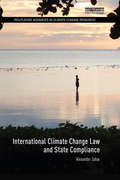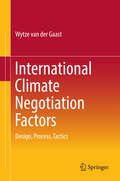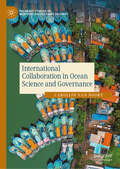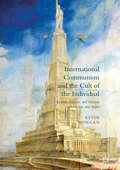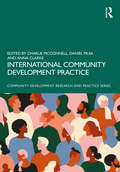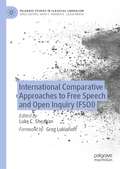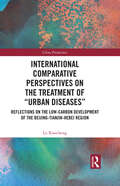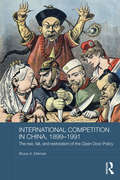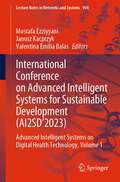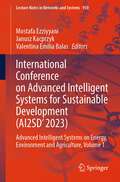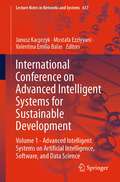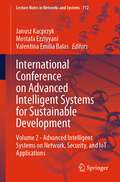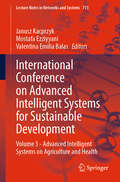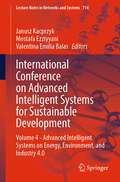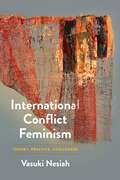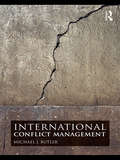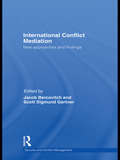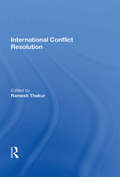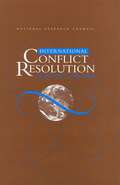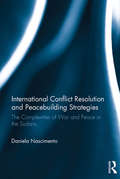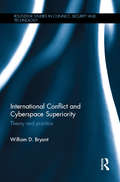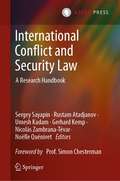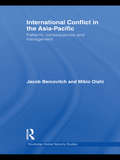- Table View
- List View
International Climate Change Law and State Compliance (Routledge Advances in Climate Change Research)
by Alexander ZaharA solution to the problem of climate change requires close international cooperation and difficult reforms involving all states. Law has a clear role to play in that solution. What is not so clear is the role that law has played to date as a constraining factor on state conduct. International Climate Change Law and State Compliance is an unprecedented treatment of the nature of climate change law and the compliance of states with that law. The book argues that the international climate change regime, in the twenty or so years it has been in existence, has developed certain normative rules of law, binding on states. State conduct under these rules is characterized by generally high compliance in areas where equity is not a major concern. There is, by contrast, low compliance in matters requiring a burden-sharing agreement among states to reduce global greenhouse gas emissions to a ‘safe’ level. The book argues that the substantive climate law presently in place must be further developed, through normative rules that bind states individually to top-down mitigation commitments. While a solution to the problem of climate change must take this form, the law’s development in this direction is likely to be hesitant and slow.The book is aimed at scholars and graduate students in environmental law, international law, and international relations.
International Climate Negotiation Factors
by Wytze GaastProviding a detailed examination of climate negotiations records since the 1990s, this book shows that, in addition to agreeing on climate policy frameworks, the negotiations process is of crucial importance to success. Shedding light on the dynamics of international climate policymaking, its respective chapters explore key milestones such as the Kyoto Protocol, Marrakech Accords, Cancun Agreement and Doha Framework. The book identifies a minimum of three conditions that need to be fulfilled for successful climate negotiations: the negotiations need to reflect the fact that climate change calls for global solutions; the negotiation process must be flexible, including multiple trajectories and several small steps; and decisive tactical maneuvers need to be made, as much can depend on, for example, personalities and the negotiating atmosphere. With regard to the design of an international climate policy regime, the main challenge presented has been the inability to agree on globally supported greenhouse gas emission reduction measures. The book offers an excellent source of information for researchers, policymakers and advisors alike.
International Collaboration in Ocean Science and Governance (Palgrave Studies in Maritime Politics and Security)
by Carolijn van NoortThis book introduces a novel model to explain how the co-design and co-delivery of ocean science knowledge and solutions is influenced by ocean stakeholders with asymmetric power and resources, policy incentives and ocean conflict, ocean narratives, different knowledge systems, security concerns, principles, formal and informal rules, and communication competences. Using the International Collaboration in Ocean Science model as a basis, the book advances with three lines of inquiry: ontological security of ocean science participants, the Ocean Decade and human well-being, and strategic narratives about international collaboration in ocean science. Through these, Carolijn van Noort shows the enabling and constraining conditions of co-creating ocean knowledge and solutions. Theoretically novel, the book provides a compelling framework for scholars to study ocean science collaboration
International Communism and the Cult of the Individual
by Kevin MorganThis book explores how the communist cult of the individual was not just a Soviet phenomenon but an international one. When Stalin died in 1953, the communists of all countries united in mourning the figure that was the incarnation of their cause. Though its international character was one of the distinguishing features of the communist cult of personality, this is the first extended study to approach the phenomenon over the longer period of its development in a truly transnational and comparative perspective. Crucially it is concerned with the internationalisation of the Soviet cults of Lenin and Stalin. But it also ranges across different periods and national cases to consider a wider cast of bureaucrats, tribunes, heroes and martyrs who symbolised both resistance to oppression and the tyranny of the party-state. Through studying the disparate ways in which the cults were manifested, Kevin Morgan not only takes in many of the leading personalities of the communist movement, but also some of the cultural luminaries like Picasso and Barbusse who sought to represent them. The cult of the individual was one of the most fascinating, troubling and revealing features of Stalinist communism, and as reconstructed here it offers new insight into one of the defining political movements of the twentieth century.
International Communism and the Spanish Civil War
by Lisa A. KirschenbaumInternational Communism and the Spanish Civil War provides an intimate picture of international communism in the Stalin era. Exploring the transnational exchanges that occurred in Soviet-structured spaces - from clandestine schools for training international revolutionaries in Moscow to the International Brigades in Spain - the book uncovers complex webs of interaction, at once personal and political, that linked international communists to one another and the Soviet Union. The Spanish Civil War, which coincided with the great purges in the Soviet Union, stands at the center of this grassroots history. For many international communists, the war came to define both their life histories and political commitments. In telling their individual stories, the book calls attention to a central paradox of Stalinism - the simultaneous celebration and suspicion of transnational interactions - and illuminates the appeal of a cause that promised solidarity even as it practiced terror.
International Community Development Practice (Community Development Research and Practice Series)
by Anna Clarke Charlie McConnell Daniel MuiaInternational Community Development Practice provides readers with practice-based examples of good community development, demonstrating its value for strengthening people power and improving the effectiveness of development agencies, whether these be governmental, non-governmental or private sector. The chapters focus upon the making of the community development profession and the eight core competences required of the professional practitioner, as outlined by the International Association for Community Development (IACD), whatever their job title or host agency, in order to be able to undertake community development. These are concerned with the ability of the practitioner to: Put ethics and values into practice Engage with communities Ensure participatory planning Organize for change Support learning for change Promote diversity and inclusion Build leadership and infrastructure Develop and improve policy and practice From a policy perspective, the book will reassert the role of community development approaches as related to a wide variety of global challenges, including poverty amelioration, climate change, human rights, peace building and social, environmental, political and economic development. From a practice perspective, the book will reassert the importance of high levels of professional competence building upon decades of experience in the field around the world by development practitioners working in community work, social work, health, adult education, environmental protection, local economic development, urban design, cultural work and other disciplines concerned to support effective community development.
International Comparative Approaches to Free Speech and Open Inquiry (Palgrave Studies in Classical Liberalism)
by Luke C. SheahanThis book explores controversies surrounding free speech and open inquiry (FSOI) in various regions of the Anglophone world. The authors argue that the past decade has seen a noticeable erosion of FSOI across the globe, aided and abetted by university clerisies and state apparatuses. These groups’ policing of language and pandering to cancel culture, the authors argue, have narrowed the Overton window to the point of reinvigorating the push for blasphemy law within liberal democracies themselves and impeding certain avenues scientific research. While most books on the subject discuss the American constitutional context of the First Amendment, this book considers free speech in the wider context of other Anglo countries. It also includes scholars from a variety of disciplines whose approaches will not only be ideologically distinct, but demonstrate a diversity of disciplinary approaches and concerns.
International Comparative Perspectives on the Treatment of “Urban Diseases”: Reflections on the Low-Carbon Development of the Beijing-Tianjin-Hebei Region (China Perspectives)
by Lu XiaochengWith an integration of theories, comparative and empirical studies, this book aims to find a treatment for Beijing’s “urban diseases” and coordinate a low-carbon development plan for the Beijing-Tianjin-Hebei region in China. Unprecedented industrialization and unconventional urbanization caused a series of “urban diseases” for developing cities across the globe. By summarizing and exploring the evolution and phased characteristics of “urban diseases”, the author implements theories across classical sociology, human ecology, community school, and low-carbon city as the base for policy recommendations. This book also provides in-depth examinations and comparative studies of other metropolises’ experiences in controlling “urban diseases”. Cities such as New York, London, and Tokyo were modeled to propose the most appropriate low-carbon development plan for the Beijing-Tianjin-Hebei region. With a focus on developing cities in Northern China, this book will be a great read to all scholars and students of environmental studies, development studies, urban studies, and contemporary China studies. It will also be a great addition for those who are interested in social conflicts and economic development.
International Comparisons of Government Expenditure
by Peter S. Heller Alan A. TaitMany studies on International tax compaisons have been undertaken since the early 1970s. While controversial, such studies have facilitated more subtle comparisons of a country's tax performance than would be afforded by focusing on its simple tax ratio.
International Competition in China, 1899-1991: The Rise, Fall, and Restoration of the Open Door Policy (Routledge Studies in the Modern History of Asia)
by Bruce A. EllemanChina's recent economic reforms have opened its economy to the world. This policy, however, is not new: in the late nineteenth century, the United States put forward the Open Door Policy as a counter to European exclusive 'spheres of influence' in China. This book, based on extensive original archival research, examines and re-evaluates China's Open Door Policy. It considers the policy from its inception in 1899 right through to the post-1978 reforms. It relates these changes to the various shifts in China’s international relations, discusses how decades of foreign invasion, civil war and revolution followed the destruction of the policy in the 1920s, and considers how the policy, when applied in Taiwan after 1949, and by Deng Xiaoping in mainland China after 1978, was instrumental in bringing about, respectively, Taiwan's 'economic miracle' and mainland China’s recent economic boom. The book argues that, although the policy was characterised as United States 'economic imperialism' during the Cold War, in reality it helped China retain its sovereignty and territorial integrity.
International Conference on Advanced Intelligent Systems for Sustainable Development: Advanced Intelligent Systems on Digital Health Technology, Volume 1 (Lecture Notes in Networks and Systems #904)
by Janusz Kacprzyk Valentina Emilia Balas Mostafa EzziyyaniThis book encapsulates the innovative discussions held during the International Conference on Advanced Intelligent Systems for Sustainable Development (AI2SD'2023), which took place at Mohammed 6 University of Sciences and Health Casablanca, Morocco. This book delves into the multifaceted realm of advanced intelligent systems, specifically focusing on digital health technology. The book offers a comprehensive exploration of cutting-edge research and breakthroughs in this dynamic field, providing a holistic perspective on the latest advancements. Within these pages, you will find papers covering an array of captivating topics, including AI-driven diagnostics, wearable health devices, predictive analytics in health care, and much more. Each contribution delves into the synergy of intelligent systems and digital health, showcasing how these technologies intertwine to shape the future of healthcare. Designed for researchers, practitioners, and enthusiasts alike, this book serves as an invaluable resource for staying updated on the latest trends and developments in the intersection of advanced intelligent systems and digital health technology. Whether you are seeking to broaden your knowledge or seeking practical insights, this book caters to a diverse readership eager to harness the potential of these innovative domains.
International Conference on Advanced Intelligent Systems for Sustainable Development: Advanced Intelligent Systems on Energy, Environment and Agriculture, Volume 1 (Lecture Notes in Networks and Systems #930)
by Janusz Kacprzyk Valentina Emilia Balas Mostafa EzziyyaniThis book is a comprehensive compilation of groundbreaking insights stemming from the esteemed International Conference on Advanced Intelligent Systems for Sustainable Development (AI2SD'2023), hosted at Cadi Ayyad University Morocco. Focused on the crucial themes of energy, environment, agriculture, and industry, this book captures the essence of transformative discussions and cutting-edge research that unfolded during the conference. Within these pages, readers are invited to explore the intricate world of intelligent systems, where innovation converges to tackle the key challenges of sustainability. The book immerses its audience in a wealth of knowledge that deeply represents the latest advancements shaping the future landscape. Diverse topics are intricately woven into the fabric of this discourse, covering AI-driven solutions designed for energy optimization, environmental sustainability, precision agriculture, and intelligent industry applications. Each contribution serves as a testament to the collaborative efforts of researchers, practitioners, and experts who gathered to drive innovation at the intersection of intelligent systems and sustainable development. Crafted as an invaluable resource, 'Advancements in Intelligent Systems: AI2SD'2023 Proceedings‘ caters to a diverse readership eager to delve into the forefront of trends and developments emerging from the crossroads of advanced intelligent systems in energy, environment, agriculture, and industry. Whether you're a researcher, practitioner, or enthusiast, unlock the transformative potential inherent in these innovative domains.
International Conference on Advanced Intelligent Systems for Sustainable Development: Volume 1 - Advanced Intelligent Systems on Artificial Intelligence, Software, and Data Science (Lecture Notes in Networks and Systems #637)
by Janusz Kacprzyk Valentina Emilia Balas Mostafa EzziyyaniThis book describes the potential contributions of emerging technologies in different fields as well as the opportunities and challenges related to the integration of these technologies in the socio-economic sector. In this book, many latest technologies are addressed, particularly in the fields of computer science and engineering. The expected scientific papers covered state-of-the-art technologies, theoretical concepts, standards, product implementation, ongoing research projects, and innovative applications of Sustainable Development. This new technology highlights, the guiding principle of innovation for harnessing frontier technologies and taking full profit from the current technological revolution to reduce gaps that hold back truly inclusive and sustainable development. The fundamental and specific topics are Big Data Analytics, Wireless sensors, IoT, Geospatial technology, Engineering and Mechanization, Modeling Tools, Risk analytics, and preventive systems.
International Conference on Advanced Intelligent Systems for Sustainable Development: Volume 2 - Advanced Intelligent Systems on Network, Security, and IoT Applications (Lecture Notes in Networks and Systems #712)
by Janusz Kacprzyk Valentina Emilia Balas Mostafa EzziyyaniThis book describes the potential contributions of emerging technologies in different fields as well as the opportunities and challenges related to the integration of these technologies in the socio-economic sector. In this book, many latest technologies are addressed, particularly in the fields of computer science and engineering. The expected scientific papers covered state-of-the-art technologies, theoretical concepts, standards, product implementation, ongoing research projects, and innovative applications of Sustainable Development. This new technology highlights, the guiding principle of innovation for harnessing frontier technologies and taking full profit from the current technological revolution to reduce gaps that hold back truly inclusive and sustainable development. The fundamental and specific topics are Big Data Analytics, Wireless sensors, IoT, Geospatial technology, Engineering and Mechanization, Modeling Tools, Risk analytics, and preventive systems.
International Conference on Advanced Intelligent Systems for Sustainable Development: Volume 3 - Advanced Intelligent Systems on Agriculture and Health (Lecture Notes in Networks and Systems #713)
by Janusz Kacprzyk Valentina Emilia Balas Mostafa EzziyyaniThis book describes the potential contributions of emerging technologies in different fields as well as the opportunities and challenges related to the integration of these technologies in the socio-economic sector. In this book, many latest technologies are addressed, particularly in the fields of computer science and engineering. The expected scientific papers covered state-of-the-art technologies, theoretical concepts, standards, product implementation, ongoing research projects, and innovative applications of Sustainable Development. This new technology highlights, the guiding principle of innovation for harnessing frontier technologies and taking full profit from the current technological revolution to reduce gaps that hold back truly inclusive and sustainable development. The fundamental and specific topics are Big Data Analytics, Wireless sensors, IoT, Geospatial technology, Engineering and Mechanization, Modeling Tools, Risk analytics, and preventive systems.
International Conference on Advanced Intelligent Systems for Sustainable Development: Volume 4 - Advanced Intelligent Systems on Energy, Environment, and Industry 4.0 (Lecture Notes in Networks and Systems #714)
by Janusz Kacprzyk Valentina Emilia Balas Mostafa EzziyyaniThis book describes the potential contributions of emerging technologies in different fields as well as the opportunities and challenges related to the integration of these technologies in the socio-economic sector. In this book, many latest technologies are addressed, particularly in the fields of computer science and engineering. The expected scientific papers covered state-of-the-art technologies, theoretical concepts, standards, product implementation, ongoing research projects, and innovative applications of Sustainable Development. This new technology highlights, the guiding principle of innovation for harnessing frontier technologies and taking full profit from the current technological revolution to reduce gaps that hold back truly inclusive and sustainable development. The fundamental and specific topics are Big Data Analytics, Wireless sensors, IoT, Geospatial technology, Engineering and Mechanization, Modeling Tools, Risk analytics, and preventive systems.
International Conflict Feminism: Theory, Practice, Challenges (Pennsylvania Studies in Human Rights)
by Vasuki NesiahAnalyzes the impact of International Conflict Feminism’s alliance with powerful global institutionsIn this book, Vasuki Nesiah tells the story of the astonishing uptake of International Conflict Feminism (ICF) in the most powerful institutions of global governance. ICF refers to a repertoire of policy agendas and legal strategies allied with those institutions to focus on women’s vulnerabilities, fight impunity for sexual violence, and promote women’s roles in peace-building processes. ICF emerged from feminist networks anchored in the Global North that gained momentum in the aftermath of the Cold War. Although this volume offers a testament to ICF’s remarkable success, it also analyzes how this success was intertwined with the defeat of alternative visions and agendas, including a range of dissident and heterodox feminisms that were eclipsed as ICF gained traction.Emerging from Nesiah’s dual occupations in academia and international law and policy practice, International Conflict Feminism shows how centrally the ICF agenda has shaped fields such as peace building, international criminal law, transitional justice, and post-conflict economic policy. Each section pauses at different sites in the international governance architecture to analyze the distributive impact of ICF and its allied global policy agendas to examine what is privileged, legitimized, and empowered, and what is subordinated, marginalized, and further excluded.ICF is a project of ideas and passions, legal proposals, and policy orientations. Today, when the most powerful countries of the world are describing their military, economic, and political interventions as a “feminist foreign policy,” the task of understanding and assessing the ICF project is especially urgent. Nesiah argues that, rather than obfuscating and denying the power of the ICF agenda, grappling with ICF’s power is essential to achieving solidarity with feminisms that don’t have a seat at the table, in particular those dissident feminist traditions with priorities and interests that challenge the dominant world order and its injustices and hierarchies.
International Conflict Management
by Michael J. ButlerThis new textbook provides students with an accessible overview of the logic, evolution, application and outcomes of the five major approaches of the growing field of international conflict management: traditional peacekeeping peace enforcement and support operations negotiation and bargaining mediation adjudication. The book aims to provide the student with a fuller understanding of the strengths and weaknesses of these five techniques within the dynamic context of the contemporary security environment, especially in relation to recent and ongoing case studies of inter-state and intra-state conflict. To demonstrate the changing nature of security in the post-Cold War world, the text contrasts this with competing visions of security during the Cold War and earlier periods, and provides numerous points of comparison with the dominant causes, types, strategy, and prosecution of warfare in other eras. International Conflict Management will be essential reading for all students of conflict management, mediation, peacekeeping, peace and conflict studies, and international security in general. Michael J. Butler is an Assistant Professor in the Department of Government and International Relations at Clark University (USA).
International Conflict Mediation: New Approaches and Findings (Routledge Studies in Security and Conflict Management)
by Jacob Bercovitch Scott Sigmund GartnerThis book examines how new empirical approaches to mediation can shed fresh light on the effectiveness of different patterns of conflict management, and offers guidelines on the process of international mediation. International conflict mediation has become one of, if not the most prominent and important conflict resolution methods of the early 21st century. This book argues that traditional approaches to mediation have been inadequate, and that in order to really understand how the process of international mediation works, studies need to operate within an explicit theoretical framework, adopt systematic empirical approaches and use a diversity of methods to identify critical interactions, contexts and relationships. This volume captures recent important changes in the field of international conflict mediation, and includes essays by leading scholars on a variety of critical aspects of conflict management, using state of the art analytical tools and up to date data. This book will of great interest to scholars of peace and conflict studies, methods in social science, and of International Relations in general.
International Conflict Resolution
by Ramesh ThakurThis book presents papers on different perspectives in tackling the economic, racial and other injustices which generate conflict. The papers infer that the nuclear threat provides the most urgent manifestation of the inadequacy of war as a means of resolving differences between nations.
International Conflict Resolution After The Cold War
by Committee on International Conflict ResolutionTo help develop insights for conflict resolution practitioners, the Committee examines evidence on the effectiveness of a dozen approaches to managing or resolving conflict in the world. It considers recent applications of familiar strategies such as threats of force, economic sanctions, and negotiations. It also assesses some less familiar approaches, including truth commissions, engineered electoral systems, and autonomy arrangements. Annotation c. Book News, Inc. , Portland, OR (booknews. com)
International Conflict Resolution and Peacebuilding Strategies: The Complexities of War and Peace in the Sudans
by Daniela NascimentoThe analysis and interpretation of conflicts can be a dangerously simplistic exercise. A western, developed socio-economic perspective can simplify conflicts in the so-called ‘Third World’ as the inevitable struggles of people who cannot coexist because of ethnic, religious or cultural differences. While acknowledging that many contemporary conflicts are characterised and influenced by these factors, this book calls for an approach to conflict prevention and resolution which mainly addresses the underlying political, economic and social causes. The conflict in Sudan, where narratives evolved from an interpretation based on religious differences between a Muslim North and the Christian South, provides a case study through which the author explores how most prevention and resolution strategies were based on flawed assumptions leading to poor results. By focusing instead on the underlying socio-economic inequality and marginalisation among groups she analyses the dynamics of the complex peace process to ascertain if and how economic and social rights were effectively included and implemented as a part of the peace agreement, including after South Sudan’s independence.
International Conflict and Cyberspace Superiority: Theory and Practice (Routledge Studies in Conflict, Security and Technology)
by William D. BryantThis book examines cyberspace superiority in nation-state conflict from both a theoretical and a practical perspective. This volume analyses superiority concepts from the domains of land, maritime, and air to build a model that can be applied to cyberspace. Eight different cyberspace conflicts between nation states are examined and the resulting analysis is combined with theoretical concepts to present the reader with a conclusion. Case studies include the conflict between Russia and Estonia (2007), North Korea and the US and South Korea (2009) and Saudi Arabia and Iran in the Aramco attack (2012). The book uses these case studies to examine cyberspace superiority as an analytical framework to understand conflict in this domain between nation-states. Furthermore, the book makes the important distinction between local and universal domain superiority, and presents a unique model to relate this superiority in all domains, as well as a more detailed model of local superiority in cyberspace. Through examining the eight case studies, the book develops a rigorous system to measure the amount of cyberspace superiority achieved by a combatant in a conflict, and seeks to reveal if cyberspace superiority proves to be a significant advantage for military operations at the tactical, operational, and strategic levels. This book will be of much interest to students of cyber-conflict, strategic studies, national security, foreign policy and IR in general.
International Conflict and Security Law: A Research Handbook
by Sergey Sayapin Noëlle Quénivet Rustam Atadjanov Umesh Kadam Gerhard Kemp Nicolás Zambrana-TévarThis unique two-volume book covers virtually the whole spectrum of international conflict and security law. It proceeds from values protected by international law (Part I), through substantive rules in which these values are embodied (Part II), to international and domestic institutions that enforce the law (Part III). It subsequently deals with current challenges in the application of rules of international conflict and security law (Part IV), and crimes as the most serious violations of those rules (Part V). Finally, in the section on case studies (Part VI), lessons learnt from a number of conflict situations are discussed.Written by an international team of experts representing all the major legal systems of the world, the book is intended as a reference work for students and researchers, domestic and international judges, as well as for legal advisers to governments and international and non-governmental organisations.Sergey Sayapin is Associate Professor and Associate Dean at KIMEP University, School of Law in Almaty, Kazakhstan.Rustam Atadjanov is Assistant Professor at KIMEP University, School of Law in Almaty, Kazakhstan.Umesh Kadam is formerly Additional Professor at the National Law School of India University, Bangalore, India and Legal Adviser with the International Committee of the Red Cross.Gerhard Kemp is Professor of Law at the University of Derby in the United Kingdom. Nicolás Zambrana-Tévar is Associate Professor at KIMEP University, School of Law in Almaty, Kazakhstan.Noëlle Quénivet is Professor in International Law at the University of the West of England, Bristol Law School in the United Kingdom.
International Conflict in the Asia-Pacific: Patterns, Consequences and Management (Routledge Global Security Studies)
by Jacob Bercovitch Mikio OishiThis book analyses four major long-standing and intractable conflicts in the Asia-Pacific region (the Korean Peninsula; the Taiwan Strait; the South China Sea (Spratly Islands); and India-Pakistan), and aims to identify the mechanisms used to manage these conflicts. International Conflict in the Asia-Pacific brings together in one volume four major international conflicts that have shaped the region, and studies how they evolved and how best to manage them. The book seeks to find a pattern common to the four conflicts and their management as well as taking note of variations among them, hereby aiming to establish what might be called the 'Asia-Pacific way of managing intractable conflicts'. This book will of much interest to students of international conflict management, Asian politics, security studies and IR in general. Jacob Bercovitch is Professor of International Relations in the Political Science Department at the University of Canterbury in New Zealand. Widely regarded as one of the most influential scholars in the field of international conflict resolution, he is author of more than 15 books and numerous articles. Mikio Oishi is a Visiting Fellow with the National Centre for Peace and Conflict Studies (NCPACS), University of Otago and a Research Fellow with Political Science Programme of University of Canterbury.
